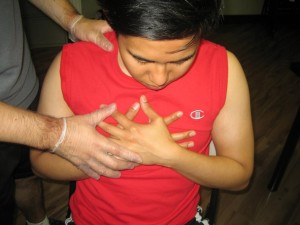Heart failure is either due to the heart incapable of filling with enough blood or the heart not pumping with enough force resulting to inadequate blood supply.
Heart failure is a condition where the heart is incapable of supplying enough blood to the whole of the body. There are two types, systolic dysfunction and heart dysfunction, which will be described later. Its name is a misnomer as it leads people to believe that a heart failure is when the heart has stopped working. When the heart stops working, it is called cardiac arrest, a very serious medical emergency. On the other hand, heart failure is when the heart has a weak pumping power, resulting to inadequate blood supply.

When a person experiences heart failure, blood flow through the heart and body is slower than normal, thus increasing pressure in the heart. Consequently, there is not enough oxygen and nutrients to meet the body’s requirements. As a result, the heart’s chamber may stretch to hold more blood or by becoming stiff and thickened. Although this will keep the blood moving, the heart muscles may weaken and pump inefficiently. This condition is sometimes also called congestive heart failure when there is fluid build-up in the arms, feet, ankles, lungs and other organs.
Types of Heart Failure
As previously mentioned, there are two types of heart failure, which are different based on which part of the heart is malfunctioning. It is possible that both types are present.
- Systolic dysfunction (systolic heart failure)
- Heart muscle does not contract with sufficient force causing to decreased amount of oxygen-rich blood to be pumped throughout the body
- Diastolic dysfunction (diastolic heart failure)
- Hearts contracts normally, however the ventricles are stiff or do not relax properly, thus the heart is not completely filled with blood during filling
Causes of Heart Failure
There are many different causes that may lead to heart failure, most of which affect the heart muscle:
- Heart attack (myocardial infarction)
- Coronary artery disease
- Cardiomyopathy
- Conditions that may overload the heart
- Heart defects
- Hypertension
- Diabetes
- Thyroid disease
- Kidney disease
- Valve disease
Signs and Symptoms of Heart Failure
Signs and symptoms of heart failure may range from mild to severe, which can include:
- Shortness of breath, especially during exercise
- Difficulty breathing even while resting or lying flat in bed
- Dry, hacking cough
- Wheezing
- Swollen abdomen, arms, ankles, feet, and legs
- Unintentional weight gain
- Increased urination at night
- Nausea
- Loss of appetite
- Bloating in the stomach
- Dizziness or confusion
- Weakness and fatigue
- Irregular heartbeats
Treatment for Heart Failure
The goals for treatment for heart failure are treatment of underlying cause, reduction of symptoms, and avoid complications from developing. Some of the treatments for heart failure include:
- Taking medications including diuretics, ACE inhibitors, aldosterone, angiotensin receptor blockers and beta blockers
- Lifestyle changes:
- A heart healthy diet
- Proper amount of fluid intake
- Avoid drinking alcohol.
- Stop smoking.
- Exercise regularly.
- Get enough rest.
Disclaimer: This article does not provide medical advice or treatment. The information given should not be used for self-diagnosis of possible conditions. Seek medical attention when necessary. Understanding heart conditions may help when taking first aid training. To learn more about to how to manage heart failure and other conditions, enrol in first aid and CPR training.
Sources:
Heart Disease and Congestive Heart Failure. (2012). WebMD. Retrieved on October 14, 2013, from http://www.webmd.com/heart-disease/guide-heart-failure
How is Heart Failure Treated?. (2012). National Heart, Lung, and Blood Institute. Retrieved on October 14, 2013, from http://www.nhlbi.nih.gov/health/health-topics/topics/hf/treatment.html

